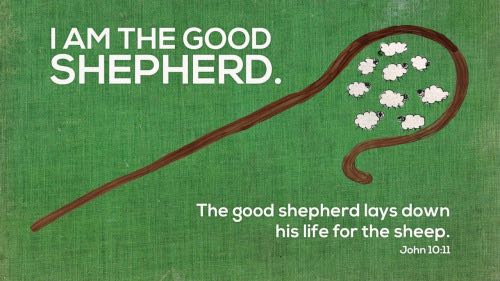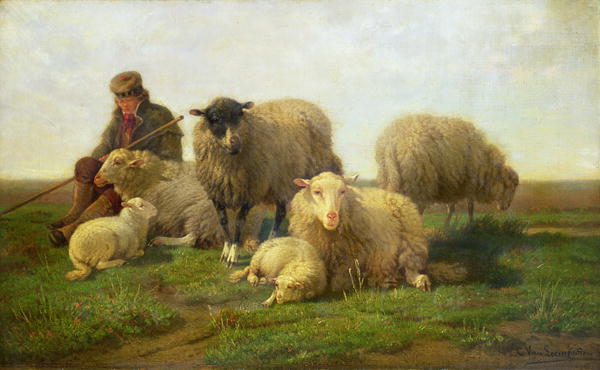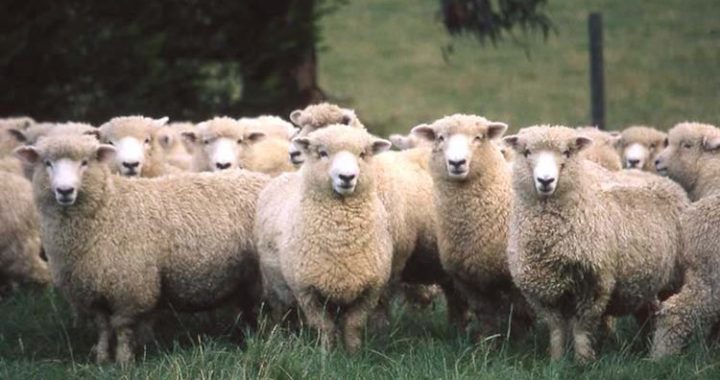This week’s Torah Portion is called “ויחי” – “Va’yechi” which means “and he lived.” The title “ויחי” – “Va’yechi” provides a great introduction to this week’s study as it speaks of Jacob’s life: “Jacob lived in the land of Egypt seventeen years; so the length of Jacob’s life was one hundred and forty-seven years.” (Gen. 47:28) This week’s Torah Portion marks the concluding section of the book of Genesis and brings to a close the life of Jacob.
Jacob lived for a total of 147 years and the last 17 years of his life were spent in the land of Egypt living near his favorite son, Joseph. It seems very providential that Joseph lived with his father Jacob until the age of 17 (Gen. 37:2), Joseph was taken away from Jacob for 22 years, and then Jacob was reunited with Joseph for the last 17 years of his life.
Scripture provides us with the information that God wants us to know and understand. These two periods of 17 years in the life of Jacob and Joseph clearly have the markings of the sovereign hand of God. The bond between Jacob and Joseph was a strong and intimate father-son relationship that was mutually enjoyed, shattered, and then restored. God used each year and each situation in the lives of Jacob and Joseph for His intended purposes and brought about a great salvation on the earth despite all of the treachery that seemed to overshadow their lives (Gen. 50:20).
Jacob’s Death
When Jacob knew that his days were drawing to a close, he called Jospeh to himself and asked Joseph to swear to him to not bury him in Egypt but to bury him with his fathers in Hebron, in the Promised Land. Joseph honored his father’s request and swore that it would be done according to his father’s words (Gen. 47:29-31).
Shortly after this time, Jacob became sick and it was known that Jacob’s time on earth was very short. Joseph came to his father Jacob with his two sons, Ephraim and Manasseh. Jacob then proceeded to bless Joseph through his two sons. After blessing Ephraim and Manasseh, Jacob then called together his twelve sons and he also blessed them before he died (Gen. 49). For a more detailed study of the blessings of the sons of Israel, I recommend the following article: Until Shiloh Comes

The Blessing
Jacob’s blessing on Ephraim and Manasseh was quite brief, however, his words speak volumes regarding his own faith in God. Jacob spoke the following blessing over Jospeh’s sons in Joseph’s name:
He blessed Joseph, and said, “The God before whom my fathers Abraham and Isaac walked, the God who has been my shepherd all my life to this day, the angel who has redeemed me from all evil, bless the lads; and may my name live on in them, and the names of my fathers Abraham and Isaac; and may they grow into a multitude in the midst of the earth.” – Gen. 48:15-16
The words of Jacob’s blessing over Ephraim and Manasseh are rich in faith and specifically request that God bring to fruition the promises which were made to Abraham, Isaac, and Jacob.
The entire first half of Jacob’s blessing on Ephraim and Manasseh is a declaration of who God is; “The God before whom my fathers Abraham and Isaac walked, the God who has been my shepherd all my life to this day, the angel who has redeemed me from all evil,…” There is a great deal to consider in the opening words to this blessing but I only want to focus on the second declaration, which speaks of the shepherding nature of God.
Trusting The Shepherd
It was just about a month ago that I wrote a Torah Portion commentary which highlights the life of Jacob as a shepherd: The Faithful Shepherd. Jacob’s profession was shepherding and he was extremely successful in this line of work. Jacob understood what it meant to be a good shepherd and he also understood what it meant to be a good sheep, in the spiritual sense. I believe that this is why Jacob spoke of the LORD in this manner: “…the God who has been my shepherd all my life to this day…”
Jacob’s Troubles
Jacob had experienced many trials and hardship in his life. He had every selfish, human reason to be angry and bitter, if it were not for his faith in God. Here are just a few highlights from Jacob’s life of troubles that he saw during his 147 years of life:
- Jacob endured a constant rivalry with his twin brother Esau even while they were still in the womb. – Gen. 25:22
- Jacob was threatened to be murdered by Esau after stealing the blessing of the firstborn. – Gen. 27:41
- Jacob was sent away from his family for twenty years. – Gen. 27:42-46
- Jacob was tricked into marrying Leah by his uncle Laban. – Gen. 29:21-24
- Jacob was made to work an extra seven years for Rachel, the wife for whom he had already worked seven years. – Gen. 29:25-30
- Jacob was continually deceived by Laban in the wages he received for his work. – Gen. 31:7
- Jacob faced the threat of returning to his angry brother Esau. – Gen. 32:3-8
- Jacob’s daughter Dina was raped by Shechem after their return to the land of Canaan. – Gen. 34:1-2
- Jacob faced the threat of the peoples of the land after Simeon and Levi took revenge on Shechem for shaming their sister Dinah. – Gen. 34:25-31
- Jacob lost his beloved wife Rachel on a journey from Bethel to Ephrath. – Gen. 35:16-20
- Jacob was made to believe that he lost his son Joseph at the age of 17. – Gen. 37:29-35
Through all of these trials and heartbreaking situations Jacob understood that God was always with him and that God was shepherding him along the way.

The Shepherd’s Voice
Although the calamities and hardships in Jacob’s life were many, so were the divine visitations from Almighty God. The LORD appeared to Jacob or spoke to him through dreams, visions, and by angels at least eight separate times during his life as recorded in the Scriptures (Gen. 28:10-17. 31:3. 31:11-13. 32:1-2. 32:24-32. 35:1,9. 46:1-4). Jacob had walked with God and had learned to hear the voice of God. The divine intervention of God in the life Jacob was a constant source of hope and peace in an otherwise chaotic world.
In The Hands Of The Great Shepherd
Jacob had witnessed a great deal of tragedy in his life, however, this was equally matched by the calming hand and voice of God. Time after time Jacob faced challenges which threatened his life and the lives of his family but through it all Jacob knew that the God of heaven and earth was right there with him in the midst of continuous uncertainty. It was as a result of God’s faithful intervention in the life of Jacob and God’s communication to him that Jacob could state without a shadow of doubt that God had been his Shepherd all the days of his life (Gen. 48:15).
All of us face various trials and tribulations along the journey of life. Being a believer in God through Yeshua the Messiah in no way exempts us from challenges in life. In fact, the Bible continually warns us and instructs us how to handle the trials of life (James 1:2-4). Rather than questioning our faith in difficult times, we need to learn to trust the Great Shepherd of our lives. We must continually go to our Shepherd with our every need, trust in His guidance and wisdom, rely upon Him for protection, and continually listening for His voice. This is what it means for us to be good sheep.

Learning To Be Good Sheep
In my commentary from the previous month, The Faithful Shepherd, I related the principle of shepherding to the dialogue between Yeshua and Peter before Yeshua ascended to the Father in heaven. In this dialogue, Yeshua questioned Peter three times if he really loved Him. Peter responded three times to Yeshua that yes, indeed he did love Him. Yeshua then countered each of Peter’s responses by challenging Peter to shepherd or tend His sheep (John 21:15-17). Yeshua was teaching Peter that his love for Him would be manifested through his act of investing in the lives of others through spiritual shepherding.
As I was preparing this week’s commentary, I noticed in Peter’s first letter in the New Testament that he illustrates for us that he learned well what his Master was trying to teach him regarding sheep and shepherding. To begin, Peter understood that Yeshua Himself is the Master Shepherd. He wrote the following words to the believers who were scattered throughout Asia minor: “For you were continually straying like sheep, but now you have returned to the Shepherd and Guardian of your souls.” (1 Peter 2:25) After years of spiritual shepherding in obedience to Yeshua’s command to him, Peter understand that we are all sheep under His care and need to fully entrust ourselves to Him.
Towards the end of this same letter, Peter exhorted the elders and leaders of the churches in those regions to be good shepherds:
Therefore, I exhort the elders among you, as your fellow elder and witness of the sufferings of Messiah, and a partaker also of the glory that is to be revealed, shepherd the flock of God among you, exercising oversight not under compulsion, but voluntarily, according to the will of God; and not for sordid gain, but with eagerness; nor yet as lording it over those allotted to your charge, but proving to be examples to the flock. And when the Chief Shepherd appears, you will receive the unfading crown of glory. – 1 Peter 5:1-4
In the same way that Yeshua challenged Peter to “shepherd the flock,” Peter in turn challenged the elders under his care to “shepherd the flock” as well. Peter exhorted the elders to be good examples to the “flock” and to look expectantly for their reward when the “Chief Shepherd” returns.
The Shepherd & The Sheep
In the above verses Peter challenged those who were in positions of authority over the believers of his day not to be cruel shepherds but rather to be kind shepherds who recognize that they themselves are just sheep of the Great Shepherd. This principle is often confused in our day as authority can easily be abused in the congregations of believers. We need to heed the words of Yeshua and Peter and learn to be good shepherds who serve the flock for their well-being.
The Hebrew word for “shepherd” is “רועה” – “ro’eh” and it means “to tend, to pasture, to shepherd” but it also has another meaning, “to be a friend of” or “to be a special friend.” We read in Leviticus 19:18 about the famous command to “love your neighbor as yourself…” the word for “neighbor” in this verse is the Hebrew word “רע” -“re’ah” and means “friend, companion, or fellow citizen.”
The Hebrew words for “shepherd” and “friend” (neighbor) have the same root, “רעה” – “ra’ah,” and I believe that God wants us to learn something about Him and us through this connection of the two words. Shepherding is a relational task. We are called to be in relationship with the Chief Shepherd of our souls. I believe that this is why Yeshua told His disciples, “I have called you friends” (John 15:15). All of those who call on the name of Yeshua are considered to be His sheep and as His sheep we are also considered His friends.

The Good Sheep
If we have the opportunity to spiritually shepherd others along this journey of life, we are called to shepherd them as friends. Jacob was a good shepherd because he knew how to relate to his sheep and at the same time he also learned what it meant to be a good sheep and to trust the LORD as his Shepherd during his 147 years of life.
The LORD is the Good Shepherd and He calls us to be good sheep and to follow Him. Yeshua spoke the following words while He was on the earth:
My sheep hear My voice, and I know them, and they follow Me. And I give them eternal life, and they shall never perish; neither shall anyone snatch them out of My hand. – John 10:27-28
In all of the clamor and noise in this world, we only really need to listen for His voice. There is everlasting peace, protection, and hope in knowing the Good Shepherd. We only need to learn to be good sheep.
Shabbat Shalom,
If you enjoyed reading this article, share it today with friends! We also invite you to sign up for our weekly Torah Portion commentary on the sidebar to the right.
Help keep our weekly commentaries free and available to all. Click here to donate today:
Torah Portion: Gen. 47:28 – Gen. 50:26
Haftara: 1 Kings 2:1-12
Return to Torah Portion Homepage
Copyright Jewels of Judaism. All rights reserved 2017



Dear Daniel,
As a result of reading your commentary, I now see that in Psalm 23, “The LORD is my Shepherd…” is Jehovah Rohi (or, Ro’eh). Moreover, the Angel Who has redeemed me” referenced in Genesis 48:15-16, as opposed to “an angel of the LORD,” must be the LORD Himself (a Theophany/Christophany). What say you?
Here is a totally unrelated question regarding this week’s Torah portion: Why was Joseph upset that Jacob insisted on blessing Ephraim before/above Manasseh? After all, Joseph was aware that Jacob was not the first born to Isaac and Rebekah, yet Jacob received the blessings above Esau. Plus Jacob favored Joseph above his brothers who had been born before him.
Much Shalom,
Sal:-) Cusmano
Hi Sal,
Great comments. First of all, yes, I agree with you, the angel in Gen. 48:15-16 seems to support the concept of the “Angel of the LORD” being divine as this angel is equated with God Himself.
Secondly, I would personally say that the reason why Joseph was trying to correct his father regarding blessing the younger above the older is two fold:
1. Since his father was old himself and couldn’t even recognize (or remember) who Joseph’s sons were, he may have just been trying to help him.
2. The status of the first born male was very ingrained in the culture of their day. Very rarely is a younger sibling given honor or authority above an older sibling. This is still the case in many cultures around the world, especially in the Middle East. Another thought, Joseph was the firstborn of his mother, Rachel, the beloved wife and first choice of Jacob.
I hope this helps shed some light on your questions.
Blessings,
Daniel
Excellent commentary! I have been become more impressed with Peter as I study his epistles. I agree with you that they reflect his relationship with the Lord Jesus.
Thanks Rosa!
Shabbat Shalom,
Daniel